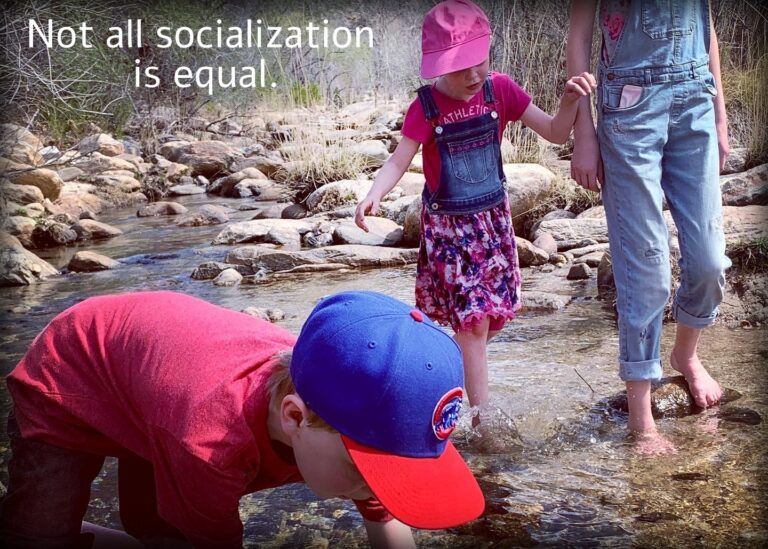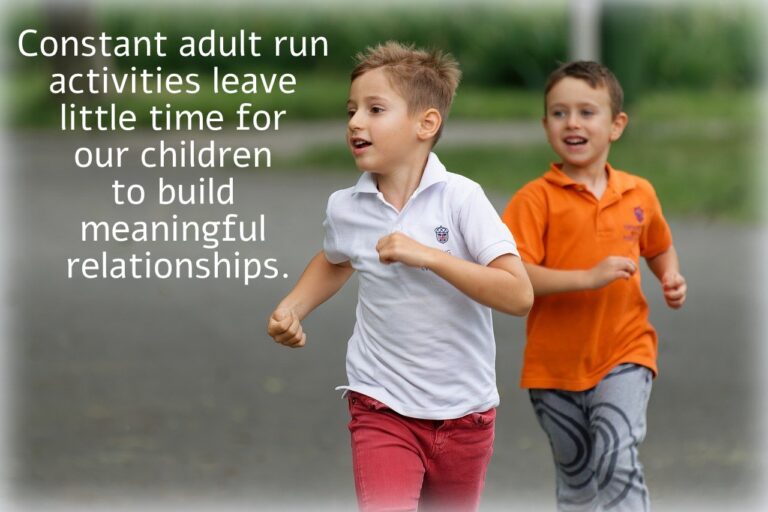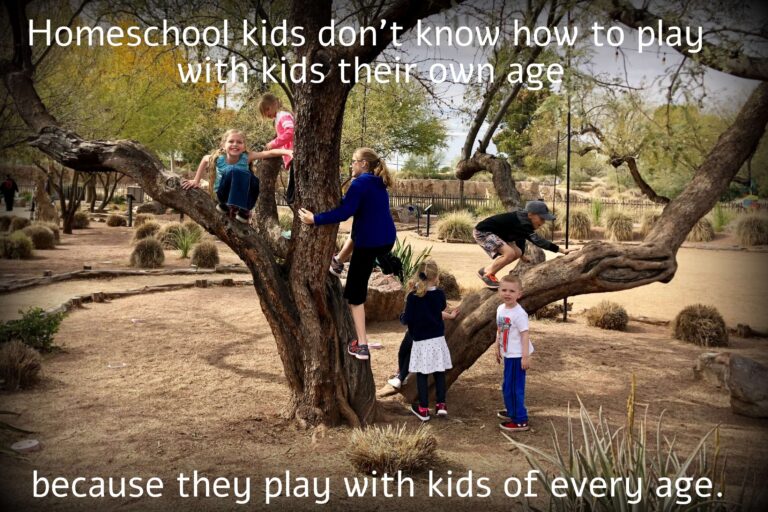Let’s Talk About Socialization!

I’m sometimes baffled that with homeschooling becoming more common and accepted that we’re still talking about socialization. I briefly address socialization in my blog post The Top 7 Reasons Why I Homeschool, but today I’ll talk about it in greater length.
My kids are running around playing with other kids, not being particularly quiet. Maybe we’re at church, or the park, or a children’s museum. One of my older children is having a lively conversation with an adult who suddenly asks, “Where do you go to school?” Once it’s discovered we homeschool, this same adult that has been conversing with my child asks me, “Homeschooling sounds great, but what about socialization? How do your kids make friends?” My immediate thought is What are we doing right now? We’re in public; my child was just having an intelligent conversation with you. My other kids are playing with other children. We obviously aren’t hiding in a cave under a mountain. Instead, I smile … but what do I say? I can only imagine how even more awkward this question becomes for homeschool families whose children are naturally more shy.
Sometimes I’m tempted give a tart, sarcastic answer, “We don’t believe in socialization.” But of course I don’t. Perhaps we are the first homeschoolers the asker has met, in which case, maybe they are surprised to find my kids are normal (however that is defined). Often, I think the question simply wasn’t thought out and is an assumption-based (almost automatic) response. Sometimes, the question is asked by someone who is considering homeschooling, or maybe just took the leap, and is worried their own children may soon lack in meaningful interactions. Now, I don’t owe anyone an explanation, but unless they are clearly being antagonistic, what are some thoughtful answers I can give that will leave the questioner a positive experience with homeschoolers?
1. We prefer to keep our children’s interactions positive.
The truth is not all socialization is equal. We want to build positive relationships in our children’s lives. As a homeschooler, I can choose who my children spend most of their time around. The Bible says, “Iron sharpeneth iron; so a man sharpeneth the countenance of his friend.”—Proverbs 27:17. Having the right friends is important. If another child in the neighborhood is a wrong influence, toxic, or manipulative, I can easily sever (if not altogether avoid) that relationship in my child’s life. This becomes much more complicated in a school setting, where I have no say over who my children are forced to be around daily.

Inevitably, someone will comment: “Kids need to have experience with bullies so they know how to face them as an adult.” I find it ironic that we campaign against bullying in schools, but then try to use the “necessity” of bullies as a reason to keep kids in school. Bullies are not needed, and homeschool children still have to face them. Sometimes the “bully” is an adult who randomly gives a “pop quiz” to our children to make sure they aren’t getting “behind.”
Reverse question: Has your children’s experience in school been mostly positive or negative? Are they struggling to make or keep friends?
2. We focus on quality rather than quantity.
In this modern day, children have nearly every minute of their life scheduled. If not at school, they are run from one extra-curriculum activity to another. Mom and dad become exhausted chauffeurs from school to sports to clubs. Children can get burned out too. Constant adult run activities leave little time for our children to build meaningful relationships. Homeschool parents have the opportunity to talk with our children during leisurely breakfast instead of rushing out the door. Kids can go outside and play instead of being bombarded with unnecessary homework. We can spend an evening stargazing and not worry about the need to rise early in the morning. Sure, we can also choose clubs or sports or homeschool co-ops, and many do. But, if those things are just making us busier and not adding to meaningful relationships, I recommend cutting some of the activities. It’s okay for kids to be bored. Children need time to play and explore without constant adult supervision in order to develop confidence.

Reverse question: Which type of socializing do you find more meaningful: that which evolves around public events or that which evolves around freewill interactions among friends.
3. Forced socialization can sometimes be traumatic for a child.
I was a naturally shy child. Contrary to what most people thought, being homeschooled didn’t “make me shy.” When I was still going to a Christian school in first grade, I was painfully shy. Forcing me to be around a large group of children daily only caused me to withdraw even more. I cried nearly every day on the way to school. Furthermore, children who don’t feel safe cannot learn because they are stuck in fight, flight, or freeze mode. For me it was freeze. I had not learned anything, and my teachers recommended that I repeat first grade. Thankfully, my mom learned about homeschooling during that time. Being at home where I felt secure, I thrived. As I grew, I gradually became bolder, but not because my mom forced me to socialize, but because she gave me the skills I needed so I could feel confident. If your child is timid and someone suggests they need socializing, you can say something like, “My child is shy. We try to build her confidence by allowing her to make small groups of friends in familiar places.”

Reverse question: Have you ever been amongst a group of people and felt overwhelmed or lonely?
4. We want our children’s social experience to be broader than a classroom full of peers.
For much of the history of our world, children learned to be adults by working alongside them in the home and out in the fields. When did being stuck between four walls, in a room of your peers, where you are discouraged to talk unless called upon, and forced to listen to an adult drone on about something you probably don’t care about become the ideal of proper socialization? Wouldn’t children spending a little more time with adults with whom they feel comfortable and free to ask questions, and spending a little less time with kids who know as little as they do, be more conducive to developing thoughtful and mature adults?

Also, homeschool kids usually have opportunities, whether with siblings or homeschool groups, to interact with all ages. Teenagers learn patience playing with and instructing elementary age children. Toddlers follow and try to copy their older siblings. Siblings become friends rather than rivals they see for moments here and there as they head to another peer only activity. Homeschool kids don’t know how to play with kids their own age because they play with kids of every age. Excluding the younger child is foreign to them. This broad spectrum of playmates allows for developing compassion in older children and maturity in the younger.
Reverse question: As an adult do you mainly interact with people your age or a broad age range?
5. We want to make the decision as to which adults influence our children.
“Blessed is the man that walketh not in the counsel of the ungodly, nor standeth in the way of sinners, nor sitteth in the seat of the scornful.”—Psalm 1:1. Sending my child to a public school puts them in the very position this verse warns us about. And even if I send my kids to a Christian school, I don’t really have a lot (if any) say in the sort of adult that influences my child. Unfortunately, there are Christian adults who have adopted what I consider worldly philosophies. Yes, I want godly Christian adults to influence my children, but I want to be the one who decides who those individuals are. Most importantly, I want myself and my husband to be the primary influence in our children’s lives. God gave the responsibility of educating children to parents. I don’t want to limit my own influence or neglect my God-given duty because I am absent from my children for most of the day.

Reverse question: Are you okay with giving over your influence and impact on your children to others for 8 hours a day?
“And these words, which I command thee this day, shall be in thine heart: And thou shalt teach them diligently unto thy children, and shalt talk of them when thou sittest in thine house, and when thou walkest by the way, and when thou liest down, and when thou risest up.”—Deuteronomy 6:6-7

Pingback: The Top 7 Reasons Why I Homeschool - Leanna Rapier
Pingback: Am I Qualified to Homeschool? - Leanna Rapier
Pingback: How Much Does Homeschooling Cost? - Leanna Rapier